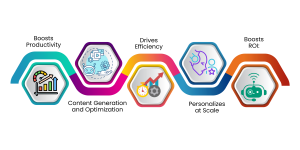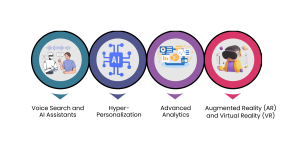to us to know how to promote business on the World Wide Web. We tell
them about different strategies that they can use different stages of their growth.
ContactUs
- +91-810-362-8856
- 106, Silver Arc Plaza, Janjeerwala Square, Indore – 452001, MP, India
-
Mon-Fri: 9am-8pm
Sat: 10am-6pm
Sun: Closed
Follow Us
How AI is Transforming Digital Marketing?
The Rise of AI in Digital Marketing
Artificial Intelligence (AI) has revolutionized numerous industries, including digital marketing. By leveraging AI, marketers can enhance their strategies, gain deeper insights, and deliver personalized experiences to their audience. This blog delves into the different types of AI, how they are used in digital marketing, their benefits, challenges, and what the future holds.
The Impact of AI on Transforming Digital Marketing
Enhancing Customer Service
AI-powered chatbots and virtual assistants have transformed customer service by offering instant, personalized responses and handling common inquiries around the clock. Virtual assistants use natural language processing (NLP) to understand and address customer queries more intelligently, providing a seamless and engaging user experience.
Advancing Content Production
AI has significantly advanced content production, making it more efficient and aligned with brand messaging. Natural Language Processing (NLP) algorithms help generate and refine content that meets SEO needs and reflects brand voice. AI tools can identify trending keywords, analyze competition, and predict search engine changes, ensuring content remains relevant and visible.
Maintaining Ethical Standards
AI technologies help maintain ethical standards in digital marketing by monitoring content placements, detecting inappropriate associations, and preventing ads from appearing in unsuitable contexts. This protects brand integrity and builds consumer trust by ensuring content and ads comply with ethical guidelines.
Revolutionizing Advertising Strategies
AI’s advanced data analysis enables precise audience targeting and predictive analytics, allowing marketers to anticipate customer behavior and create highly effective ad campaigns. By understanding consumer trends and optimizing ad placements, AI enhances engagement and improves return on investment (ROI).
What are the Pros and Cons of AI in Marketing?
AI is no different from any other technology in that there are pros and cons to using it. It’s important for marketers to be aware of these so they can make decisions about what tasks to use AI for and how to use it.

The Pros
Boosts Productivity:
Automating repetitive tasks with AI can free up time for more creative and strategic work. For example, AI tools can schedule and post on social media based on optimal times for engagement.
Drives Efficiency:
AI can streamline daily tasks such as data entry, sorting campaign leads, and responding to customer queries, making operations more efficient.
Offers Insights: AI’s data-driven capabilities provide valuable insights into customer behavior and campaign performance, informing strategic decisions.
Personalizes at Scale:
AI can analyze customer data to create personalized content and recommendations, enhancing the customer experience. This is particularly useful in email marketing, where AI can tailor messages to different customer segments based on their actions and preferences.
Content Generation and Optimization:
AI tools have the capability to produce optimized content at scale for various digital channels. This is crucial for SEO, as tools like ChatGPT can help target specific keywords or phrases that align with customer intent.
Boosts ROI:
AI insights can predict buying behavior, improving user experience and delivering relevant content at each stage of the marketing funnel, thereby boosting ROI.
Predictive Analysis: AI can analyze historical data to predict market trends and customer behavior, aiding in more accurate and effective planning.
The Cons
Lack of Accuracy:
Inaccuracies in data can lead to faulty analysis and costly business decisions.
Requires Skills:
While AI tools are more accessible, they still require knowledge and skills to use effectively. Marketers must acquire new skills and practical experience with AI tools.
Bias:
AI effectiveness is dependent on the data it uses, which can sometimes contain biases related to gender, race, culture, or socioeconomic status.
Data Sensitivity and Security: AI systems often use extensive datasets, including sensitive information, which must be managed securely.
Ethics:
Ethical concerns involve obtaining consent, manipulating user data and behavior, and the “creepy factor” associated with hyper-targeted ads.
Transparency:
As AI-generated content becomes more common, issues regarding plagiarism, authorship, transparency, and intellectual property protection will become more significant.
Will AI Replace Digital Marketers?
The advent of AI has sparked debates about its potential to replace human jobs. However, AI is more likely to augment rather than replace digital marketers. Here’s why:
1. Enhanced Decision-Making:
AI can process and analyze data much faster than humans, providing valuable insights that inform decision-making. However, human creativity and strategic thinking remain irreplaceable. AI can suggest the best time to send an email campaign, but it’s the marketer who crafts the compelling message.
2. Efficiency and Productivity:
AI can handle repetitive and time-consuming tasks, freeing up marketers to focus on strategy, creativity, and innovation. For example, AI can automate the scheduling of social media posts, allowing marketers to concentrate on creating engaging content.
3. Collaboration:
AI tools often work alongside marketers, providing recommendations and automating routine tasks while allowing humans to oversee and guide the overall strategy. This collaboration enhances the effectiveness of marketing campaigns by combining the strengths of both AI and human marketers.
Automated Content Creation and Optimization
AI is transforming content creation and optimization in several key ways:
1. Content Generation:
AI tools, such as GPT-4, can efficiently create various types of content including blog posts, social media updates, and video scripts. While human editing might still be necessary, AI significantly speeds up content production, allowing for higher volumes and maintaining quality.
You may also like : ChatGPT 3.5 vs 4.0: Should You Buy the Plus Subscription?
2. SEO Optimization:
AI enhances content visibility by analyzing search engine algorithms and optimizing content for better rankings. This includes providing keyword suggestions, structuring content effectively, and identifying gaps in existing material.
3. Performance Analysis:
AI tracks content performance in real-time, offering insights into what resonates with audiences and suggesting improvements. For instance, it can identify which blog posts attract the most traffic and recommend topics for future content.
Challenges and Ethical Considerations
Despite its advantages, AI introduces several challenges and ethical concerns:
1. Data Privacy:
AI’s reliance on extensive data raises issues about data collection, storage, and usage. Marketers must ensure compliance with data protection regulations and maintain transparency with customers, including obtaining explicit consent for data use.
2. Bias and Fairness:
AI systems can inherit biases from their training data, leading to potentially unfair outcomes. Regular audits are essential to ensure AI operates fairly and does not perpetuate discrimination.
3. Job Displacement:
The automation of tasks through AI may lead to job displacement. Marketers need to adapt and acquire new skills to stay relevant in an AI-driven landscape, emphasizing the need for continuous learning.
4. Trust and Transparency:
AI-driven interactions may raise customer concerns. Marketers should be transparent about AI usage, ensuring it enhances rather than detracts from the customer experience and clearly communicating how customer data is used.

The Future of AI in Digital Marketing
The future of AI in digital marketing is set to be transformative:
1. Voice Search and AI Assistants:
As voice search grows, AI assistants like Alexa and Siri will play a crucial role. Marketers will need to optimize for voice search and develop content that aligns with voice-activated queries.
2. Advanced Analytics:
AI will continue to advance, offering more sophisticated analytics and insights. This will help marketers understand their audience better and refine strategies with greater precision.
3. Hyper-Personalization:
AI will drive hyper-personalization, creating highly individualized experiences based on real-time data analysis and customer behavior. This ensures that marketing messages are tailored to each customer’s unique preferences.
4. Augmented Reality (AR) and Virtual Reality (VR):
AI-powered AR and VR will offer immersive experiences, transforming how brands engage with customers through virtual try-ons or interactive tours.
Conclusion
AI is reshaping digital marketing, offering unparalleled opportunities for personalization, efficiency, and innovation. Addressing challenges and ethical considerations will ensure AI’s positive impact on the industry. Embracing AI is essential for staying competitive and delivering exceptional customer experiences. The future promises further advancements, setting new standards in digital marketing.
